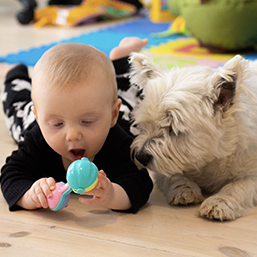
Have you ever watched social media and been captivated by unassuming newborn babies being licked and greeted by their newest furry family member? Often it seems cute, sweet, and something we all dream of when introducing our new baby to the existing dog. We see so many sweet images of dogs and babies, dogs and kids, and dream of this beautiful relationship that they could have. Unfortunately, for many parents, this is not their experience. Have you ever worried, “What if my dog doesn’t like my baby?”
\n \nMany parents reach out for support after an introduction has occurred and there was an unwanted response from the dog. Suddenly they find themselves fearful of their pet harming their baby. This is unfortunate, as something as simple as taking the pressure off an introduction and doing some work ahead of time could prevent both this feeling and allow the dog to adjust in their own time. Family Paws suggests reframing the idea of an introduction to a “homecoming” period. Jennifer Shryock, CDBC, says, “When we think of introductions, we often see face-to-face, close proximity, and either the dog, parent, or both get uncomfortable.”
\nThis often leads to the parent pushing the dog away and can quickly become a negative interaction. We don’t need this high-stress introduction, what we should do is take the pressure off and make it a non-event for the dog as much as possible.
\nDogs need time to adjust to their new expectations and it often takes time, guidance, and support from their guardians. We tend to have high expectations of our dogs to have an instant bond with our baby, and for many families, that is just not the case. When we force interactions and relationships, it often leads to negative consequences. Relationships between dogs and kids need to have two sides and an aware adult to support them. It is natural for a dog to be unsure or curious of a baby, especially if they have never experienced a newborn. Babies are loud, change the dynamics of the family, and will add extra stress on parents.
\nDogs do not understand how the rules have changed, and often their relationship with their guardians are also different. They have less attention, fewer walks, and their schedule that used to be very predictable is no longer consistent. They can struggle with baby milestones – as babies learn and grow, their new skills develop quickly and can catch our dogs off guard. Suddenly that baby that was laying on the floor is up and moving towards them, and that can be frightening. Dogs don’t have any way of knowing how a baby is going to act from moment to moment, and that unpredictability is something that many dogs struggle with.
\nParents can do a lot to support their dogs through this transition. If they think about how their dog’s life is going to change when they bring home the new baby and prepare them for those expectations ahead of time, it can prevent a lot of issues when they are faced with juggling the needs of a newborn, a dog, and their own needs.
\nTeaching the dog to have some separation while everyone is home, so they can have some decompression time away from the business of small children, can be a huge help for many dogs. It is often a skill that is overlooked by many, as the dog may be fine being home alone but when you are suddenly home all the time, they do not get the same amount of rest they did before. Thinking about your dog’s behavior and things you do to accommodate them now is also important, so that you can get ahead of the behaviors that will cause conflict when you have a baby in your arms.
\nWith some forethought, training, and adding in additional supports for the dog, parents can help their dogs through this huge event. Do not wait until the baby is here to start! Success often depends on working through the changing expectations ahead of time.
\n\n
Elysia has been working with dogs and kids for over a decade. She is a CPDT-KA certified trainer and a Family Paws Parent Educator. She is a mom of two young children, and co-owner of Pawstive Families Education & Training. Her business is dedicated to working specifically with families with dogs and helping parents overcome any issues between dogs and kids. She has a background in humane education, childcare, and worked in shelters and rescues. Elysia is dedicated to educating parents on how to create bonds between their children and dogs that last a lifetime.
\n\n
See our related articles:
\nCalgary’s Child Magazine © 2025 Calgary’s Child